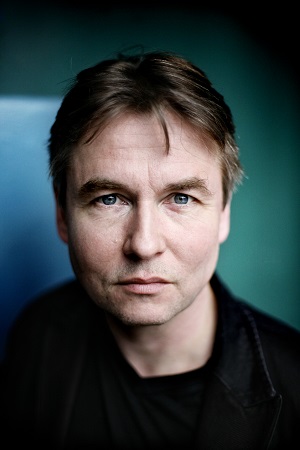After their first Gurrelieder with him in March 2009, I was at an airport where many of the players were talking excitedly about Gurrelieder and the way Salonen worked with them. Musicians can be blasé (at least on the surface), but these players were genuinely enthusiastic. And they didn't know that I was listening in !
The deep surging undercurrents in the Prelude, lit by bright sparkling figures, seemed almost to vibrate. Well-defined the strings, harps and horns introduced the dream-like mood, textures gradually build up in sweeping arcs, string lines swelling and heaving. Perhaps Schoenberg had in mind Tristan und Isolde, or Siegfried's journey down the Rhine. Either way, vast cosmic forces are being invoked. Or can we hear echoes of Verklärte Nacht writ infinitely larger ? Schoenberg then introduces the mortals, King Waldemar (Robert Dean Smiith) and Tove (Camilla Tilling). The parts are tricky to cast, since Schoenberg, in his youth, pits the singers against huge orchestral forces. Yet voice along doesn't create a part. Simon O'Neill, for example, doesn't have a pretty voice but more than compensates with artistry and insight. Waldemar was anti-hero enough that he dares curse God : a Flying Dutchman of sorts. Dean Smith didn't quite have the heft or gift for characterisation, so this Waldemar came across in milder form, though the music around him roared with passion. Tilling created a refined Tove, her lines soaring gracefully, serving the part well. Few Tove's are truly "wunderliche" but Tilling is attractive, as gentle as a dove. Tove is silenced, but the Wood Dove takes her place.
The Wood Dove, a much stronger personage than Tove, is an Erda figure, who sees all, and the mood is almost incantation. . Michelle DeYoung was ideal, her rich timbre enhanced by sombre dignity. The recurring line "Weit flog ich....." rose forcefully from the surging undercurrents, bringing out the rhythmic flow. Every good performances helps us think more about the music. This time I was pondering how the Wood Dove's music might resemble Sprechstimme. A pity that the "Herrgott ! Herrgott!" part didn't have quite the impact in the Royal Festival Hall as it could have. The front of that stage sucks voices into the void even if you've got a voice-friendly seat. On the BBC Radio 3 broadcast, Dean Smith's can be heard with better balance. In the orchestra, however, the "Herrgott!" chords were magnificent, executed so they seemed to have a metallic quality, like hammerblows striking stone.
A haunted, baleful introduction to the final part, when the orchestra seemed to explode with the horror of the apocalyptic vision being described. Trombones wailed, percussion rumbled, strings evoking a sense of wind and wildness. Waldemar and his doomed knights are riding theough the sky. Another excellent cameo with David Soar's Peasant. The firmness in Soar's timbre suggested that even a doughty peasant can be so shaken that he must bolt his door and pray. The Philharmonia Voices were augmented by the male voices of the Royal Academy of Music, the Royal College of Music, the Guildhall School of Music and Drama and the Trinity Laban Conservatoire of Music and Dance.In the relatively small space of the Royal Festival Hall, the impact could have been overwhelming, but under the direction of Aidan Oliver, what came over was clarity, not sheer volume. Good articulation, the "Holla!"'s wild, the sudden descent into near silence chilling. Yet again, the orchestra set the scene. The strings surged, then opened out to strangely disturbing calm, the woodwinds adding quirky menace. Despite the turbulence around him, Waldemar is alone.
Thus the spooky interlude before Klaus-Narr sings, cloaking the part with surreal horror. Wolfgang Ablinger Sperrhacke is one of the finest "Character" singers in the business, so this cameo, like Michelle DeYoung's Wood Dove, was a major highlight. Ablinger-Sperrhacke captured the strange, disjointed rhythms in the part extremely well, the "fool" easily the match of the orchestra. Perhps Waldemar is the fool, still obsessed by ."Ich und Tove, wir sind eins", oblivious to his predicament. Thus the brooding in the orchestra before the male choirs returned, textures subdued yet uncowed. "Ins Grab! Ins Grab!" A particularly good Wild Hunt of the Summer Wind, tubas booming, let by high winds, with chamber-like delicacy in the playing. The role of the Speaker is usually cast with a singer whose voice is past its bloom, but whose musical instincts are still strong enough to declaim with Sprechstimme intonation. Some of the great singers of the past have done the Speaker so he/she feels like a ghost from the past, revived, like Waldemar and his Knights, a thoughtful insight. Barbara Sukova is an actress with musical nous, whose voice is still fairly youthful, so her Speaker was different, closer perhaps to Klaus-Narr commenting on the spectres, as opposed to being one of them, which is perfectly valid. A blazing "Seht die Sonne!"! and the audience in the Royal Festival Hall went wild. In orchestral terms, this was an outstanding Gurrelieder, Salonen and the Philhrmonia delivering with insight and understanding.
Anne Ozorio
